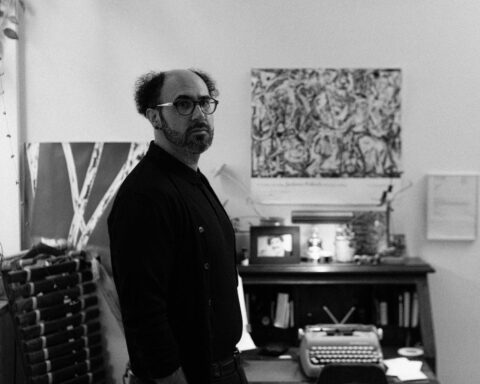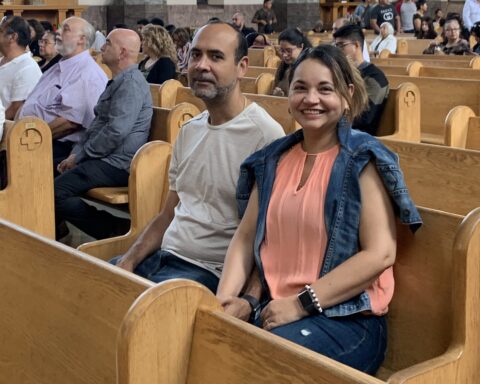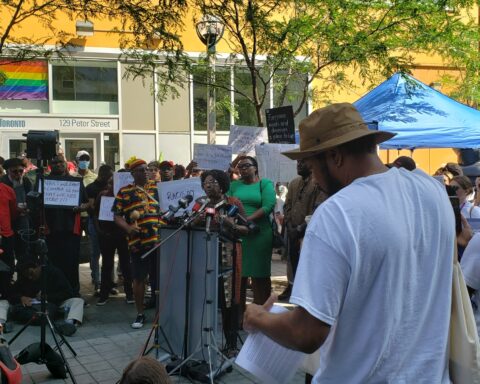A panel discussion on the newly published collection of essays The Relevance of Islamic Identity in Canada: Culture, Politics, and Self, shows that there are multiple ways of being Muslim.
The event was held on March 3 at Simon Fraser University’s Goldcorp Centre for the Arts in Vancouver, and opened with an address by the book’s editor and publisher, Nurjehan Aziz. Her vision of the diversity of Muslims in Canada is demonstrated in her selection of essay contributors.
Safia Fazlul, Ameen Merchant and Mohamed Alibhai were engaged in a one-on-one conversation with Zool Suleman, immigration lawyer and director of MARU, a non-profit organization that explores the intersections between migration, art and race.
Diversity in Islam
All three panellists spoke of their experiences as immigrants to Canada, and how being Muslim played into their relocation. Fazlul, who was born in Bangladesh, raised in Norway and moved to Toronto at the age of 10, explained that while she felt like an outsider in Norway, she experienced a greater sense of belonging in Canada because of the ethnic diversity.
It wasn’t until after 9/11, when Fazlul was in grade 10, that she felt her identity as a Muslim in Canada was questioned. Fazlul chooses to keep her religious beliefs private, opting to not wear the hijab.
“The plurality of interpretations is absolute for me. We all see the world through our own experiences of community and faith.”
“As a not-to-so religious person who grew up with very religious parents, I can offer a unique story with respect to being raised Muslim and hopefully challenge some stereotypes of Muslim women,” said Fazlul.
Fazlul’s key message was, “Muslims are the same — that being a Muslim means to simply practice a religion just like Jews and Christians do. Muslims are human beings, all from different walks of life and unique in thought.”
Merchant, who was born in Mumbai, India, said he identifies as a “cultural Muslim.” He came to Canada in 1989 to pursue a graduate degree at the University of British Columbia in English Literature and Cultural Studies.
Merchant explained that he initially refused to contribute an essay for this project, “as I did not think I was a the right person to address issues regarding Islam [and] Muslims.”
However, he accepted in hopes of providing a different perspective. “The plurality of interpretations is absolute for me. We all see the world through our own experiences of community and faith. No one interpretation is higher or more valid than the other. We are all composites of varied influences and identities. What unites us is our common humanity,” said Merchant.
The final panellist, Mohamed Abualy Alibhai, was also born in India, grew up in Tanzania, and spent most of his adult life in the U.S. As a student of physics, mathematics and geophysics, Alibhai made a drastic change in his academic trajectory after being admitted to the Islamic Studies graduate program at McGill University, and thereafter obtaining a doctorate in Islamic Philosophy from Harvard University.
“Islamic identity is very relevant to Canada because future generations of Muslims will be strong supporters of the Canadian Charter of Freedoms and will work to strengthen it for the benefit of all Canadians,” said Alibhai.
“The writers were disappointingly apologetic about their Muslim identity, many of them repeatedly asserting that they don’t practice the religion.”
Missing critical topics
Some Muslim-identified audience members were critical of the panel and the way the topic of Canadian Muslim identity was interpreted.
Community organizer Tahia Ahmed was drawn to the event because she felt a conversation on Muslim identity in Canada is important in the current post-Harper political climate, where she believes “Islamophobia is alive and well despite losing its most powerful Canadian advocate.”
“I was anticipating a critical dialogue on key issues impacting Muslims, such as Bill C-51 and C-24, using Muslim women as political instruments during the last elections, and the use of fear mongering to justify racism against Muslims,” said Ahmed.
“Instead, the writers were disappointingly apologetic about their Muslim identity, many of them repeatedly asserting that they don’t practice the religion.”
She referred to Fazlul’s response to the question of what it means to be a Muslim — that a Muslim is just like a Christian and a Jew — as “bizarre.”
Itrath Syed, a PhD student in the School of Communication at Simon Fraser University, was worried by comments made regarding the situation of Muslims in the U.S.
“Instead of reflecting critically on the racist discourse of the current election cycle in the U.S., [Alibhai] asserted that ‘Trump has been misunderstood.’”
“That may be the opinion of this speaker, but it is clearly not shared by the countless Americans and global individuals and organizations, both within and outside of the Muslim community, who are greatly alarmed by the language and proposed policies of Donald Trump and his supporters,” said Syed.
“I don’t know how representative this small panel was of the content of the book,” said Syed, “However, this panel in no way represented the vast diversity of experiences and struggles of Muslims in Canada and the U.S.”
A recent review of the book on rabble.ca criticized it for reinforcing the “the conflation of Islam with South-Asian and Arab identity,” also reflected in the entirely South-Asian panel.




